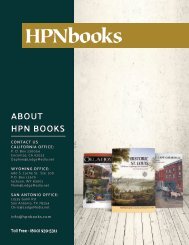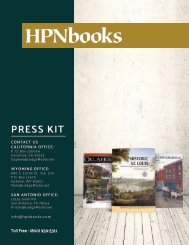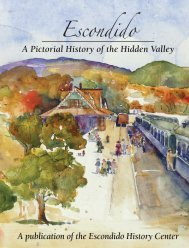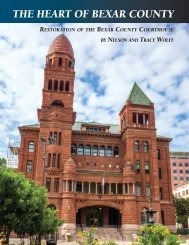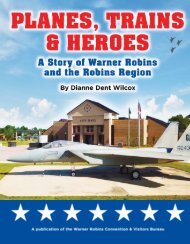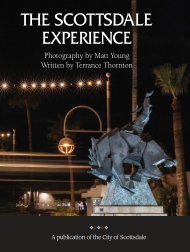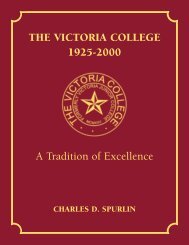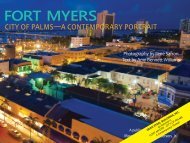In The Cradle of Industry and Liberty
An illustrated history of Philadelphia's manufacturing sector paired with the histories of local companies that make the city great.
An illustrated history of Philadelphia's manufacturing sector paired with the histories of local companies that make the city great.
You also want an ePaper? Increase the reach of your titles
YUMPU automatically turns print PDFs into web optimized ePapers that Google loves.
MAKING A CASE<br />
FOR AMERICAN<br />
MANUFACTURING<br />
On August 9, 1787, Philadelphia merchant<br />
<strong>and</strong> economist Tench Coxe spoke before<br />
“an assembly <strong>of</strong> the friends <strong>of</strong> American<br />
manufactures, convened for the purpose <strong>of</strong><br />
establishing a Society for the encouragement<br />
<strong>of</strong> Manufactures <strong>and</strong> the useful arts.”<br />
<strong>The</strong> assembly was held at the University <strong>of</strong><br />
Pennsylvania, then located at Fourth <strong>and</strong><br />
Arch Streets, just a few blocks from the<br />
State House (now <strong>In</strong>dependence Hall), where<br />
delegates to the Constitutional Convention<br />
were then in the final stages <strong>of</strong> drafting the<br />
new U.S. Constitution. <strong>The</strong> latter document<br />
would not be completed for another five<br />
weeks, but Tench Coxe was already charting<br />
a new industrial course for the young nation.<br />
Advocating for increased development <strong>of</strong><br />
American manufacturing in general, <strong>and</strong> for<br />
the adoption <strong>of</strong> the new mechanized industrial<br />
processes recently introduced in Engl<strong>and</strong><br />
specifically, Coxe outlined a vision for the<br />
future <strong>of</strong> American industry to the assembled<br />
group that formed itself into the Pennsylvania<br />
Society for the Encouragement <strong>of</strong> Manufactures<br />
<strong>and</strong> the Useful Arts, with Coxe serving as its<br />
secretary <strong>and</strong> chief promoter. Some excerpts<br />
from his address:<br />
“Factories [as opposed to indentured<br />
servants]…are not burdened with any heavy<br />
expense <strong>of</strong> boarding, lodging, clothing, <strong>and</strong><br />
paying workmen <strong>and</strong> they supply the force<br />
<strong>of</strong> h<strong>and</strong>s to a great extent…. By wind <strong>and</strong><br />
water machines we can make [a wide range<br />
<strong>of</strong> products]…. Steam mills have not yet been<br />
adopted in America, but we shall probably<br />
see them after a short time…. Machines…will<br />
give us immense assistance. <strong>The</strong> cotton <strong>and</strong><br />
silk manufactures in Europe are possessed<br />
<strong>of</strong> some that are invaluable to them. Several<br />
instances have been ascertained, in which<br />
a few hundreds <strong>of</strong> women <strong>and</strong> children<br />
perform the work <strong>of</strong> thous<strong>and</strong>s.”<br />
mostly by h<strong>and</strong> in small shops to production<br />
on a larger scale in mechanized factory<br />
settings was well underway in Engl<strong>and</strong> by the<br />
1780s but had not yet been adopted to a<br />
great extent in America. Still primarily an<br />
agrarian society, the United States relied<br />
heavily on the importation <strong>of</strong> finished goods<br />
rather than their domestic manufacture.<br />
<strong>In</strong> his 1787 address <strong>and</strong> in subsequent<br />
writings Coxe proposed increasing the<br />
nation’s industrial output. Four years later, as<br />
Assistant Secretary <strong>of</strong> the U.S. Treasury under<br />
Alex<strong>and</strong>er Hamilton, Coxe would contribute<br />
significantly to Hamilton’s influential 1791<br />
Report on Manufactures to the U.S. Congress.<br />
INTRIGUE AND<br />
ENTREPRENEURSHIP<br />
Coxe <strong>and</strong> Hamilton were not just making<br />
philosophical arguments; they were actively<br />
engaged in manufacturing endeavors themselves<br />
in the 1780s <strong>and</strong> 1790s. <strong>In</strong> 1787 Coxe<br />
tried to have the model for a new cotton<br />
spinning machine smuggled out <strong>of</strong> Engl<strong>and</strong>,<br />
@<br />
Above: Philadelphia businessman <strong>and</strong><br />
economist Tench Coxe (1755-1824).<br />
An influential figure in the early<br />
development <strong>of</strong> American manufacturing,<br />
Coxe served as Assistant Secretary <strong>of</strong> the<br />
U.S. Treasury under Alex<strong>and</strong>er Hamilton.<br />
PORTRAIT COLLECTION, HISTORICAL SOCIETY<br />
OF PENNSYLVANIA.<br />
Left: A View <strong>of</strong> the United States<br />
<strong>of</strong> America, by Tench Coxe, 1794.<br />
Coxe published this collection <strong>of</strong> his<br />
1787-1794 writings <strong>and</strong> speeches on a<br />
wide range <strong>of</strong> subjects, including<br />
American manufacturing.<br />
HISTORICAL SOCIETY OF PENNSYLVANIA.<br />
Tench Coxe was essentially introducing<br />
the <strong>In</strong>dustrial Revolution to America. <strong>The</strong><br />
transition from artisans making products<br />
CHAPTER THREE<br />
33





